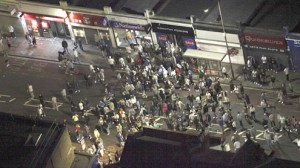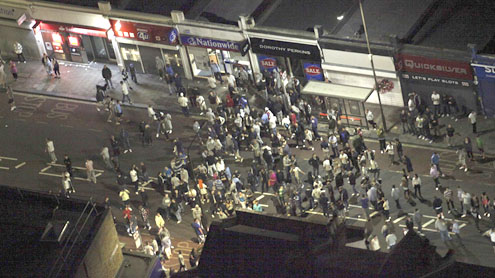 A week ago chaos erupted on the British streets sending a typically law-abiding populace into an uncharacteristic frenzy. Since then mobs have set ablaze shops, private property and private businesses, and have stretched the metropolitan police to near breaking point. Amidst this hysteria, the riots have chalked up their first few fatalities — and they happen to be Pakistani.
A week ago chaos erupted on the British streets sending a typically law-abiding populace into an uncharacteristic frenzy. Since then mobs have set ablaze shops, private property and private businesses, and have stretched the metropolitan police to near breaking point. Amidst this hysteria, the riots have chalked up their first few fatalities — and they happen to be Pakistani.
Two brothers, Shehzad Hussain and Mussawer Ali, and their friend Haroon Hussain were killed when a hit and run driver sped into them as the protests spread to Birmingham where the victims were protecting their property. A group of some 80 people belonging to the South Asian community were guarding a petrol pump belonging to the family of the victims when a car rammed into the crowd.
The initial reaction to this news of three dead Pakistanis during the riots was that of suspicion that there may be a racist aspect to the attack. However, that may not be the reason as the driver — who has been arrested — is a black man.This senseless tragedy might well be nothing more than the three men simply being in the wrong place at the wrong time.
The rioters are in a rage and any community operation to counter their frenzy will be seen as an antithesis to their resentment. Which brings us to a question it seems no one is asking: why is the British youth so angry? As the protests continue, so do the arrests. Some 1,100 have been booked so far and one sees that the profile of the protesters has a large range, covering almost all age groups and backgrounds.
The rioters have attacked symbols of ‘late capitalism’ from designer labels and electronics to sporting goods — all symbols of a lifestyle rammed down the throats of impressionable young minds unable to find a balance between the projected glamorous image and the inescapable reality of their dismal lives where unemployment and social spending cutbacks are the norm.
There is a reason these looters are going for the goods: if they cannot earn the marketed lifestyle, they think they can simply help themselves to it. That is the true power of large-scale advertising where life is rendered cheap and meaningless without brands and labels being thrust at you from all directions.
The sense of deprivation and injustice in the UK’s marginalised underclass — a class that took to the streets in the 1980s and loudly protested in the student riots a few months back against the rise in tuition fees and increase in taxes — has reached tipping point. This is evident in this spontaneous mass uprising that is quickly spreading throughout the UK without any real organisation or planning. It is a gathering of the disgruntled, the deprived and the hungry. That says plenty about how the Conservative-Liberal Democratic dispensation of David Cameron has been indifferent to the problems of these people.
Returning from holiday, Cameron immediately recalled parliament and flexed some muscle by vowing a “fight back” against this ‘criminality’. Widespread arrests are occurring and the courts are working round the clock to convict proven rioters. With maximum punishment being declared, Cameron’s government might be able to quell the riots — for now.
However, the fact that the British public is so disenchanted and so bombarded with a lifestyle that is becoming increasingly difficult to attain, we can say with a fair degree of certainty that the underlying anger will not go away. While the immediate storm may pass, the deeper social, political and economic problems prevalent on the streets of London and beyond will take much more than a mere nip/tuck to mend. Tough policing might quash the riots but they will not quash the resentment born out of austerity measures and welfare cuts. – Dailytimes












